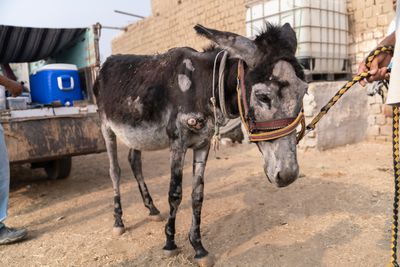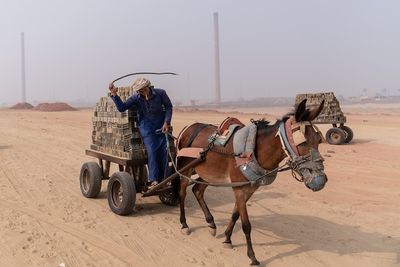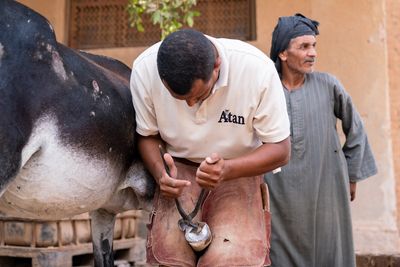UK charity launches public appeal to help working donkeys in Egypt
Published:
Read Time: 8 mins
Thousands of vulnerable animals need urgent veterinary care due to a region-wide lack of available expertise.
UK charity Safe Haven for Donkeys is calling for support for a new pilot project providing critical veterinary care for thousands of donkeys and mules working in the brick kilns in Egypt. There are approximately 1,000 brick kilns in Egypt, manufacturing building materials to satisfy the country’s housing boom. Due to the availability and cost of machinery, donkeys and mules play an important role in the manufacturing process, namely in moving the sun-dried bricks by cart to the furnaces for firing.
The donkeys and mules carry heavy loads of bricks weighing around 1.4 to 1.6 tonnes, (1,400 to 1,700kg) and move at an intense pace, in order to prevent unfired bricks cracking in the day's heat. These vulnerable animals do not have the urgent veterinary care they need, due to a region-wide lack of available expertise in the Al Giza desert. They have not received treatment for many years and are suffering unimaginable pain due to harness and saddle wounds, beatings, teeth and hoof issues and parasitic diseases spread by flies.
In collaboration with local Egyptian community development charity, the Bridge Foundation (El Gesr), Safe Haven for Donkeys are working in the area of El Saf, 100 km south of Cairo in the Al Giza desert. The project is focusing its support on 120-180 tightly grouped brick kilns where around 3,000 working donkeys and mules work tirelessly to produce millions of bricks all year round. The initial year-long project includes a mobile veterinary clinic made up of a highly experienced equine vet, as well as two farriers – one of which was a brick kiln owner himself.
The team are treating common injuries and infections, such as those from poor harnessing, overgrown hooves and bad teeth, which are easily treatable and go a long way in improving the lives of the animals who work so hard for so little. Alongside treatment the team are providing training for the owners on how best to look after their animals – ensuring more nourishing food, adequate rest and the correct use of harnesses and saddles to avoid wounds. In this way, Safe Haven helps to ensure that with the right care, donkeys will not need to suffer.
The team urgently needs to raise £60,000 to fund the first year of the Egyptian mobile veterinary clinic, ensuring they have the medicine and equipment necessary to treat sick and injured donkeys at the El Saf brick kilns. Whilst the project will directly impact on the 3,000 animals located in the kilns, it will also improve the lives of many thousands more. Through the training sessions with professionals, the local community are set to benefit as they also rely heavily on working equids for farming and transport.
Safe Haven for Donkeys began in 2000 with focused support in Israel and the Palestinian territories and has been supporting 10,000 equids a year for the past 20 years. Safe Haven’s new project in Egypt aims to support 1,000 donkeys in the first few months alone.
Safe Haven for Donkeys CEO, Andy Foxcroft, explains: “Through our work in Israel and the West Bank we came to know of millions of working animals in neighbouring Egypt without critical veterinary care, suffering a host of preventable and treatable painful conditions. Currently no other animal welfare charity provides veterinary interventions in these particular kilns, hence the need for Safe Haven’s expertise, on the ground, treating sick and injured animals and providing training for owners and local professionals (vets and farriers). This first year is vital as we hope to make a lasting impact by reducing the unnecessary suffering of working animals, which sadly, is all too common a feature in the brick kilns.
Andy continues: “The estimated annual cost of the project will be £60,000 in the first year or £192 to fund the mobile veterinary team for a day, to provide treatment to hundreds of donkeys in the brick kilns. Just £20 can help turn the life around for a distressed donkey and ensure instant pain relief through vital veterinary care. Your contribution will also support its owner to help that donkey to live a longer, healthier life. With your support, Safe Haven can provide instant pain relief for thousands of vulnerable working donkeys. Making a huge impact – one animal at a time”.
The project is being backed by several VIPs including the actor and animal activist Peter Egan, who has been a patron of the charity since 2020.
Peter comments: “Having been an animal activist for many years, I have seen working animals being mistreated across the world. I congratulate Safe Haven for Donkeys for expanding their compassionate work in Israel and the West Bank into Egypt to help even more donkeys, mules and horses.”
For more information and to support Safe Haven for Donkeys project in Egypt visit https://www.safehaven4donkeys.org/egypt-2023
Photos including distressing images of donkeys previously treated are available here.
Ends
Editors notes
About Safe Haven for Donkeys
Safe Haven for Donkeys is a British registered charity that cares for working and abandoned donkeys in Israel and the Palestinian Territories and since 2023, in Egypt. It helps an estimated 10,000 animals a year and the Egypt project will see this support extending to thousands more.
The charity, which was set up in 2000, runs a donkey sanctuary near the Israeli town of Netanya and a programme of free veterinary clinics for working donkeys, mules and horses in the Palestinian Territories. The team regularly visits towns and villages where they offer free veterinary care, advice on tooth and hoof care, harnessing and nutrition alongside education and support for the owners. The charity has a permanent clinic in the Palestinian city of Nablus, and two mobile clinics in Hebron and the Jordan Valley treating up to 200 working donkeys, mules and horses every week.
Safe Haven for Donkeys' Egypt project
Safe Haven for Donkeys’ new 12-month pilot programme in Egypt is to support working equids in the brick kilns, manufacturing building materials to satisfy the country’s housing boom. The team’s initial focus is supporting thousands of donkeys that work around 120 - 180 brick kilns (of which 600 are in the El Saf region), but given that other owners have already approached them for support, that number is likely to grow fast.
With 3,000 donkeys in the area requiring treatment now, Safe Haven are running a fundraising appeal to raise £60,000 to fund the first year of the mobile veterinary clinic. The project will help to significantly improve the welfare of animals working in the brick kilns and strengthen the understanding of communities reliant on these vulnerable animals to prevent maltreatment.
The brick kilns are generally located in rural areas where veterinary services are scarce and, where they are available, the service is not necessarily affordable. Many of the more serious wounds inflicted on the donkeys and mules are from beatings with sticks, lengths of hose and rope. When the donkeys are unfit to work, they are simply discarded and replaced. Their working life is therefore short, hard and miserable.
The key aims of Safe Haven’s initial 12-month project are to significantly reduce injuries, lameness and the number of beatings that commonly occur. The team’s work will impact on injury prevention through better harnessing and cart design as well as providing the right nutrition to keep the donkeys and mules healthy and strong. Training is also an essential element of the work and will focus on upskilling government vets, veterinary students, lay professionals (farriers etc), owners and handlers.
Whilst the project will directly impact on the 3,000 animals located in the kilns, it will also improve the lives of many thousands more. Through the training sessions with professionals, the local community are set to benefit as they also rely heavily on working equids for farming and transport.
Children are widely used to handle the donkeys. Their day starts at 4am when it is still cool and finishes at 10am before it gets too hot, followed by school. It is hoped that the project will also indirectly support children as well as the animals.
The estimated annual cost of the project will be £60,000 in the first year, or £20 for every animal in need.
Historic data on kiln donkeys
According to a study* by the Egyptian Society for the Protection and Welfare of Working Animals (ESPWWA), in 2017 there were over 1,000 brick kilns in Egypt, most of which use working equids. The study focused on 250 brick kilns in the Giza area which is about 57km south of Cairo. These kilns maintain a population of 1,350 donkey stallions and 55 mules. For the purpose of the study, 20 kilns were chosen at random which housed 179 donkeys.
The study found that around 80% of the kiln donkeys they examined had some type of wound, the most serious being a beating wound (49%), which is caused by drivers hitting the donkeys. The drivers are mostly children who lack knowledge, skills and a basic understanding of animal husbandry to effectively manage the welfare needs of their equids. Other wounds are related to the harnesses such as the breeching (strap around the haunches), saddle, neck collar and shaft of the cart. Poor body condition was also commonplace. The families that work in the kilns are some of the poorest in society and they live in conditions, often at the site of the kilns, not much better than those of the donkeys.
*The full report, Welfare Assessment and Identification of the Associated Risk Factors Compromising the Welfare of Working Donkeys (Equus asinus) in Egyptian Brick Kilns, by Shaaban F. Farhat, Amy K. McLean and Hamdy F. F. Mahmoud, is available at https://www.mdpi.com/2076-2615/10/9/1611/htm



